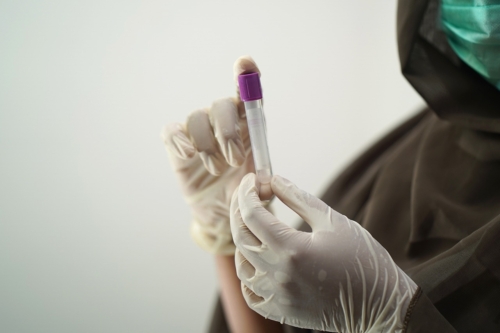
Man sentenced to two years in prison for infecting his partner with HIV and how not telling is not a crime
The man, who has had the virus since birth, told the Barcelona Provincial Court that he did not know he was a carrier and that he thought the pills he was taking were vitamins.
He is 32 years old, has been a carrier of HIV since birth because his mother passed it on to him during pregnancy or childbirth, and on 28 October he was sentenced by the Provincial Court of Valencia to two years in prison for transmitting the disease to his partner. The victim, who testified behind closed doors at the trial, assured the court that during the year and a half that she had a relationship and lived with him – from June 2019 to January 2021 – he never told her that he had HIV and that, knowing that he could transmit the disease to her, he had unprotected sex with her. The woman, whom this newspaper has tried to contact, has declined to share her testimony, ‘because of the delicate situation she is going through’, according to her lawyer, to whom the victim, who suffers from a depressive disorder as a result of the infection, has also asked for discretion. The sentence, for a crime of gross negligence resulting in serious illness, includes compensation for her of 208,250 euros.
The convicted man, according to the sentence, defended himself at the trial by assuring that, although it was true that he had been taking antiviral pills to fight the infection since he was four years old, he thought that they were vitamins; at least that is what his mother had said. He didn’t know he had HIV, he said.
The specialist who had been treating him, however, testified that the defendant had been a patient at the infectious diseases ward of Valencia’s Doctor Peset Hospital since 1996 and that he was aware that he was a carrier of HIV. ‘He explained to him, because he does this with all patients, the nature of his illness and the measures he had to take to have safe sex,’ the ruling reads.
The man stopped seeing a specialist, which increased his viral load.
Between October 2018 and June 2020 – coinciding with the period when he was paired with the complainant – the practitioner added, he stopped attending HIV follow-up appointments, which may have led to an increase in his viral load and risk of infection. ‘At his last test in 2018, his viral load was minimal and he was not contagious. The defendant’s viral load on the 4-6-20 test was 22,400 copies/ml and on 7-7-21 it was 23,000 copies/ml, having stopped taking treatment for a season prior to 7-7-21. Statistically, with a viral load of 20,000 copies/ml, the possibility of infection is 15%’, the sentence states.
The woman discovered that her then-partner had HIV after the housekeeper found some unused pills in a trouser pocket. ‘They are vitamins,’ he explained. Later, she herself found the medication in his things and searched the internet: they were antivirals. Immediately – in January 2021 – she went for an HIV test, which came back positive.
The case brings to the forefront the criminal responsibility of those who transmit diseases such as HIV. Is someone who is HIV-positive obliged to inform the people with whom they have sex of their status, and if they have a stable partner, are they exonerated from any contagion if they use protection, and what happens if protection fails?
In Spain, based on the right to privacy, no one has the legal obligation to reveal to their sexual partners, whether sporadic or stable, their state of health. This is what the Supreme Court ruled in June 2011. The High Court heard the case of Eva, who accused her former husband of hiding the fact that he had AIDS, infecting her with HIV and, indirectly, making the daughter they had, who was infected during childbirth, a carrier as well. Rodrigo, according to the proven facts, had known that he was infected with the virus since 1994, when he was 22 years old. Two years later, he began a relationship with 19-year-old Eva, with whom he had sex without telling her that he was HIV positive, but always using protection. On ‘four or five occasions’ the condoms broke and as a result Eva became pregnant, giving birth to a baby girl in May 1997. Three months later, the girl became ill and tests revealed that she had HIV, as did the mother.
The chances of infecting her partner, says the ruling, were 15 per cent.
Even though Eva knew at the time that her partner had concealed and transmitted the disease, she continued the relationship. They married in 1997, divorced in 2003, and three years later, in 2006, she reported him for the infection. The court did not focus on these details of the relationship but on the fact that he had used a condom, despite keeping his health condition secret.
Thus, the lower courts – the 21st Court of Instruction of Madrid and the Provincial Court of Madrid- acquitted Rodrigo, considering that he had scrupulously followed the medical protocol to avoid transmission: the use of a condom. The Supreme Court ruled in the same sense, acquitting him of the crime of intentional injury, that is to say, committed intentionally, knowing the harm that was going to be done. ‘The fact that he did not inform his partner of the serious and contagious disease he was suffering from, however much it may rightly be reprehensible from an ethical point of view, adds nothing to the criminal unlawfulness of the conduct,’ said the Supreme Court.
One year for transmission
The High Court did find a reckless crime of injury, accusing Rodrigo of ‘careless behaviour’ for not taking the ‘necessary diligence to avoid breaking [the condoms], for which he was sentenced to two years in prison – one for each infection – and to compensate his ex-wife and daughter with a total of 50,000 euros.
It is different when the HIV carrier does not use a condom with a sexual partner and the latter is unaware of his condition – as in the case tried in Valencia -, cases in which the courts have ruled severely. In 2011, the Provincial Court of Madrid sentenced a man who had lived with a woman for two years, had unprotected sex with her and was infected to nine years in prison. The same sentence was imposed by the Supreme Court in 2017 on another man from Zaragoza who had also transmitted HIV to the woman he was living with.
The sentences in the first cases to come before the courts are much more lenient. The first was tried in 1995 in Santa Cruz de Tenerife. The complainant was a woman who had entered into a relationship with an army brigade officer stationed on the island. He, who did not tell her that he was HIV-positive and did not use a condom during their sexual encounters, was sentenced to one year in prison.
In 2006, a Barcelona court sentenced a 74-year-old man to three years’ imprisonment on a charge of intentional wounding in conjunction with gross negligence manslaughter for transmitting HIV to a woman who died of the virus a year after they met. As in the previous cases, the transmitter concealed his status and did not use protection.
El condenado a dos años de cárcel por contagiar VIH a su pareja y cómo no contarlo no es delito
El hombre, con virus desde que nació, aseguró al tribunal de la Audiencia Provincial de Barcelona que no sabía que era portador y que creía que las pastillas que tomaba eran vitaminas
Tiene 32 años, es portador del VIH desde que nació debido a que su madre se lo contagió durante el embarazo o el parto y el pasado 28 de octubre fue condenado por la Audiencia Provincial de Valencia a dos años de prisión por transmitirle a su pareja la enfermedad. La víctima, que declaró a puerta cerrada en el juicio, aseguró ante el tribunal que durante el año y medio que mantuvo una relación sentimental y convivió con él -de junio de 2019 a enero de 2021-, nunca le contó que tuviera VIH y que, a sabiendas de que podía transmitirle la enfermedad, mantuvo relaciones sexuales con ella sin protección. La mujer, con la que ha intentado contactar este diario, ha declinado compatir su testimonio, «por lo delicada de la situación que está viviendo», según trasmite su abogado, al que la víctima, que sufre un trastorno depresivo a consecuencia del contagio, le ha pedido igualmente discreción. La condena, por un delito de imprudencia grave con resultado de enfermedad grave, incluye una indemnización para ella de 208.250 euros.
El condenado, recoge la sentencia, se defendió en el juicio asegurando que, si bien era cierto que tomaba unas pastillas desde que tenía cuatro años de edad -antivirales para luchar contra la infección-, él pensaba que se trataba de vitaminas; eso al menos lo había dicho su madre. Desconocía que tuviera VIH, dijo.
El especialista que lo había estado tratando, sin embargo, declaró que el acusado era paciente del área de enfermedades infecciosas del Hospital Doctor Peset de Valencia desde 1996 y que tenía conocimiento de que era portador del VIH. «Le explicó, porque con todos los pacientes lo hace, la naturaleza de su enfermedad y las medidas que tenía que adoptar para tener sexo seguro», se lee en el fallo.
El hombre dejó de ir al especialista, lo que aumentó su carga viral
Entre octubre de 2018 y junio de 2020 -coincidiendo con el periodo en el que estuvo emparejado con la denunciante-, añadió el facultativo, dejó de acudir a las citas para el seguimiento del VIH, lo que pudo provocar un aumento de su carga viral y del riesgo de contagio. «En su último análisis de 2018, la carga viral era mínima y no contagiaba. La carga viral que tenía el procesado en el análisis de fecha 4-6-20 era de 22.400 copias/ml y en fecha 7-7-21 de 23.000 copias/ml, habiendo dejado de tomar el tratamiento durante una temporada anterior al 7-7-21. Estadísticamente, con una carga viral de 20.000 copias/ml, la posibilidad de contagio es del 15%», concreta la sentencia.
La mujer descubrió que su entonces pareja tenía VIH después de que la empleada del hogar encontrara unas pastillas deshechas en el bolsillo de un pantalón. «Son vitaminas», explicó él. Más tarde, ella misma halló la medicación entre sus cosas y buscó en internet: eran antivirales. Inmediatamente -enero de 2021- acudió a hacerse una prueba de VIH que resultó positiva.
El caso trae a la actualidad la responsabilidad penal de quienes trasmiten enfermedades como el VIH. ¿Está obligado alguien seropositivo a informar de su condición a las personas con las que mantiene relaciones sexuales? ¿Y si se trata de una pareja estable? ¿Está exonerado de cualquier contagio si usa protección? ¿Qué sucede si esta falla?
En España, en base al derecho a la intimidad, nadie tiene la obligación legal de revelar a su parejas sexuales, ya sea esporádicas o estables, su estado de salud. En este sentido se pronunció el Supremo en junio de 2011. Ante el Alto Tribunal llegó el caso de Eva, que acusaba a quien había sido su marido de ocultarle que tenía sida, contagiarla de VIH e, indirectamente, hacer portadora también a la hija que tuvieron, quien se contagió en el parto. Rodrigo, se relataba en los hechos probados, conocía que estaba infectado con el virus, desde 1994, cuando tenía 22 años. Dos después, inició una relación con Eva, de 19 años de edad, con la que mantuvo relaciones sexuales sin contarle que era portador de VIH, pero utilizando siempre protección. En «cuatro o cinco ocasiones» los preservativos se rompieron y fruto de ello Eva quedó embarazada, dando a luz a una niña en mayo de 1997. Tres meses después, la niña enfermó y las pruebas a las que fue sometida revelaron que tenía VIH, al igual que la madre.
Las posibilidades de contagiar a su pareja, dice el fallo, eran del 15%
Pese a que Eva supo entonces que su pareja le había ocultado y transmitido la enfermedad, continuó la relación. Se casaron en 1997, se divorciaron en 2003 y, tres años después, en 2006, ella lo denunció por el contagio. No se centró la Justicia en estos pormenores de la relación sino en el hecho de que él, pese a mantener en secreto su estado de salud, había utilizado preservativo.
Así, las instancias inferiores -el juzgado de Instrucción número 21 de Madrid y la Audiencia Provincial de Madrid- absolvieron a Rodrigo al considerar que había seguido escrupulosamente el protocolo médico para evitar la transmisión: usar preservativo. En el mismo sentido se pronunció el Supremo, que lo absolvió de un delito de lesiones doloso, es decir, cometido intencionadamente, sabedor del daño que se va a hacer. «El hecho de que no comunicase la grave y contagiosa enfermedad que padecía a su pareja, por mucho que pueda ser justamente objeto de reprobación desde un punto de vista ético, no añade nada a la ilicitud penal de la conducta», decía el Supremo.
Un año por contagio
Sí apreció el Alto Tribunal un delito imprudente de lesiones, achacando a Rodrigo «un comportamiento descuidado» por no poner la «diligencia necesaria para evitar esas roturas [de los preservativos], por lo que lo condenó a dos años de prisión -uno por cada contagio- y a indemnizar a su ex mujer e hija con un total de 50.000 euros.
Diferente es cuando el portador de VIH no utiliza preservativo con una pareja sexual y ésta no sabe de su condición -como sucede en el caso juzgado en Valencia-, supuestos ante los que la Justicia se ha pronunciado severamente. A nueve años de prisión condenó en 2011 la Audiencia Provincial de Madrid a un hombre que había convivido dos años con una mujer, mantenido relaciones sexuales sin protección con ella y contagiado. La misma condena impuso el Supremo en 2017 a otro varón zaragozano que igualmente había transmitido el VIH a la mujer con la que vivía.
Muchos más laxas son las condenas de los primeros casos que llegaron ante los tribunales. El primero fue juzgado en 1995 en Santa Cruz de Tenerife. La denunciante era una mujer que había entablado una relación con un brigada del Ejército destinado en la isla. Él, que no le contó que era portador de VIH ni usó preservativo en sus encuentros sexuales, fue condenado a un año de cárcel.
En 2006, un juzgado de Barcelona condenó a tres años de prisión por un delito de lesiones dolosas en concurso con otro de homicidio por imprudencia grave a un hombre de 74 años, quien había trasmitido el VIH a una mujer que falleció a consecuencia del virus un año después de que se conocieran. Como en los casos anteriores, el transmisor ocultó su estado y no usó protección.
A man faces eleven years in prison for having sex without a condom with his girlfriend and transmitting HIV
The Valencia Public Prosecutor’s Office claims that the defendant concealed from the victim that he was infected with the virus and accuses him of a crime of injury.
The first section of the Provincial Court of Valencia will try on Monday 14 October a man accused of ‘transmitting the AIDS virus to his partner, whom he did not inform that he was infected and with whom he had sex without a condom’.
According to the information provided by the High Court of Justice of the Valencian Community, the defendant and the victim maintained a relationship between June 2019 and February 2021 during which they lived together in her house in Valencia. According to the public prosecution, the defendant, ‘a carrier of the virus since birth, hid it from his partner, who was infected’.
According to the information provided by the High Court of Justice of the Valencian Community, the defendant and the victim maintained a relationship between June 2019 and February 2021 during which they lived together in her home in Valencia. According to the public prosecution, the defendant, ‘a carrier of the virus since birth, hid it from his partner, who was infected’.
According to the same official sources, the victim would have known when she found some pills in the defendant’ s clothes and discovered that they corresponded to a treatment for the disease.
The Public Prosecutor’s Office is provisionally requesting a prison sentence of eleven years for the offence of assault and battery.
La Fiscalía de Valencia sostiene que el procesado ocultó a la víctima que estaba contagiado del virus a y le acusa de un delito de lesiones.
La sección primera de la Audiencia Provincial de Valencia juzga el lunes 14 de octubre a un hombre acusado de «transmitirle el virus del sida a su pareja sentimental, a la que no informó que estaba contagiado y con la que mantuvo relaciones sexuales sin preservativo«.
De acuerdo con la información suministrada por el Tribunal Superior de Justicia de la Comunidad Valenciana, procesado y víctima mantuvieron una relación sentimental entre junio de 2019 y febrero de 2021 durante la que convivieron en la casa de ella, en Valencia. Según relata la acusación pública, el encausado, «portador del virus desde su nacimiento, se lo ocultó a su compañera sentimental, que resultó contagiada».
De acuerdo con la información suministrada por el Tribunal Superior de Justicia de la Comunidad Valenciana, procesado y víctima mantuvieron una relación sentimental entre junio de 2019 y febrero de 2021 durante la que convivieron en la casa de ella, en Valencia. Según relata la acusación pública, el encausado, «portador del virus desde su nacimiento, se lo ocultó a su compañera sentimental, que resultó contagiada».
Siempre según las mismas fuentes oficiales, la perjudicada lo habría sabido al encontrar unas pastillas entre la ropa del encausado y descubrir que correspondían a un tratamiento para la enfermedad.
La Fiscalía solicita provisionalmente para el acusado una pena de prisión de once años por un delito de lesiones.



